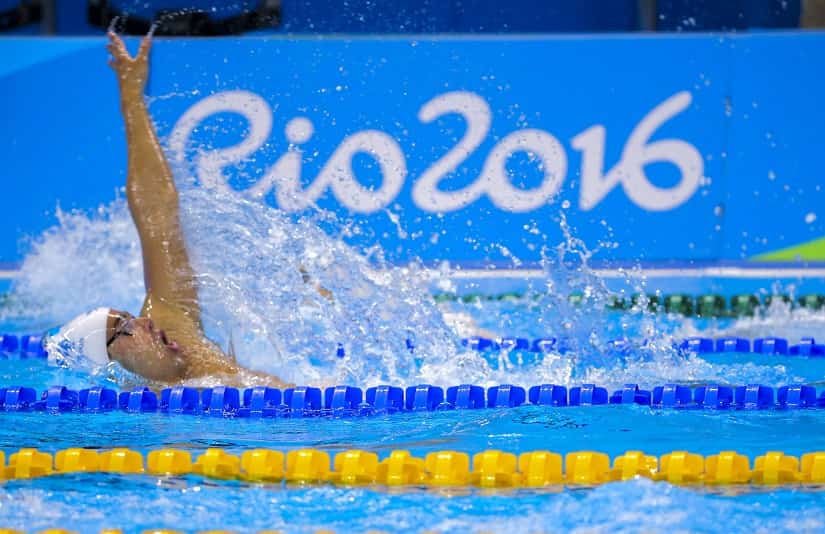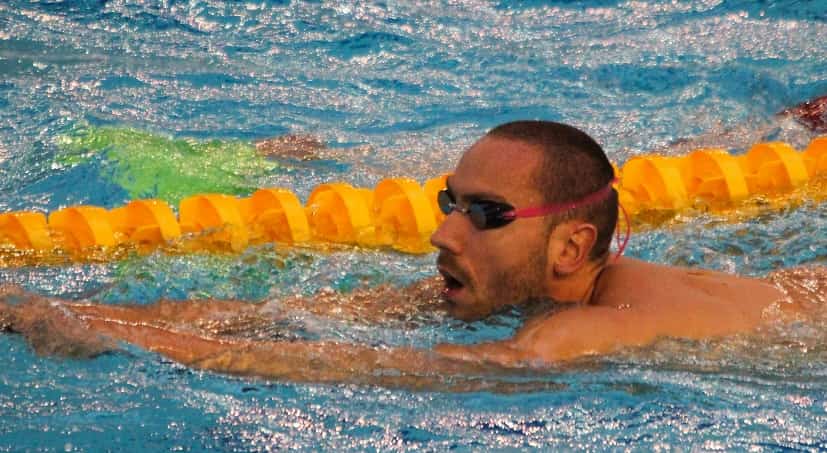Quick question: When was the last time you got uncomfortable in training? Today? Yesterday? Last week? Longer?
I don’t mean just that general feeling of lethargy and tiredness, but when was the last time you tried to do something in the water that you’d never done before?
If you want to unleash a dazzling performance at the end of the year, and you are tired of not seeing the progress you want in the water, it’s time to do a header into that fearsome unknown that lies beyond your comfort zone and self-perceived limits.
Steadily poking and prodding our comfort zone is essential if we want to get better in the water.
So does that means you should go blast out a stunt of a swim workout (i.e. 100×100) for that burst of confidence?
Not really. That kind of “hero” workout isn’t sustainable.
Rather, you should be progressively turning up the difficulty of your workouts over time. Each week you should be inching forward, leveling up your training in a pattern of pushing and cracking your comfort zone.
How does this look? Well, for Katie Ledecky, whose work ethic is her greatest strength it meant failing on a target pace, coming back for more, failing again, getting a little closer before failing, and then finally nailing it. It meant getting uncomfortable in training repeatedly before making that jump in improvement.
This back-and-forth is critical if you want to get better. Otherwise, you end up in the same well-worn loop, doing the same things over and over again and wondering why you aren’t improving.
To crack open the next level of your swimming, you gotta get comfortable being uncomfortable.
The (Other) Big Benefit of Pushing Boundaries
Pushing yourself in the pool—conquering the argument when your body is saying, “No thanks, I’d rather go sit on the couch and crush some ‘flix”—has benefits beyond just giving you a ripping performance on race day.
Which should be plenty. The thought of crushing it in competition has pushed many a swimmer to do the right thing in practice.
But there is another benefit that you should pay attention to.
In research [1] published in the British Journal of Healthy Psychology, a group of collegiate students were instructed to start exercising. From no workouts a week they went up to just a handful of workouts; a totally manageable 2-3 sessions in the gym.
As you would expect, some good things started happening. Stress went down. The students ate better. They even did their chores more often.
Along with the standard benefits of improved physical health, their self-control improved significantly.
In other words, the ability to push past the initial thoughts of “Eww, I don’t really feel like doing this, it’s gonna probably suck” that is typical with exercising helped them strengthen their self-control, which propelled the life changes that were happening outside the gym.
Self-control has regularly been found to be a key indicator of overall life satisfaction and happiness (which makes sense, I’m rarely enthralled with myself after moments of blatantly low self-control—I have the empty pizza boxes and angry tummy to prove it).
Pushing out of your comfort zone and doing hard stuff turns out to be a “keystone” habit—something that you do and inspires a ripple of positive change across the rest of your life.
Getting comfortable being uncomfortable, as it turns out, can help us swim faster and maybe even help us make our bed once in a while too.
The Next Step: How to Get Okay with Being Uncomfortable
Okay, so pushing our limits in the pool is good. Thanks, Captain Obvious. But how do we convince ourselves, in the heat of the moment when the main set is going up and that “I don’t wanna do this set” lump is crawling up your throat to push things?
It’s a universal resistance: We want the improvement but we don’t want the pain and discomfort that comes along with it.
Here’s some ideas for how to get better swimming outside your comfort zone.
That moment of discomfort is an opportunity to get better.
Of all the cool things that happen as a result of us working hard in the water—those big, boulder shoulders, the sixish-pack of abs—there is little that is more rewarding than seeing progress.
The moment you do a best time in competition is awesome, yes, but that moment replicates itself on a smaller scale in training: the first time you break a minute in practice; the time you cracked open your 100 kick PB by three seconds; conquering an interval you’ve never done before; out-performing the results you did last time on a test set.
Yes, the suffering will be real. But the satisfaction you get from busting through to the other side will outweigh it.
By starting the battle is half won.
Don’t think about the discomfort. (Well, try not to.)
Just think about the first step. The first stroke. The first set. The first lap. Whatever the first step is. I preach this little mental trickeroo over and over again because of its stunning effectiveness.
The misery and heaviness of starting is always worse than the actual physical pain we endure while pushing ourselves.
Just do one more.
I have a small saying scrawled on my water bottle, and it is this: “1MR.” It’s a reminder, displayed front and center at the end of my lane, to give it one more rep.
When you are feeling exhausted and want to give up, do one more rep. When you don’t “feel like it” but you have five more rounds of the main set, do one more rep. When your shoulders are buckling, and your mindset is following suite, do one more rep.
This is a simple mental training technique known as “creating more ends”—by making the finish line appear closer than it is we are able to maintain effort for a little while longer.
Hang out with faster swimmers.
Like it or not, the environment that we create and choose for ourselves has a profound impact on our choices in the water.
You have likely already experienced this at some point: the time you trained with swimmers a little faster than you, pushing you to keep up. Likewise, you’ve had sessions with slower swimmers that left you feeling a little bored, coasting through the workout.
If you want to get to the next level, and bust through the discomfort that comes along with it, spend time with faster swimmers. Not only will their performance redefine what is possible (“If they can do it, so can I”), but their wake will pull you along.
You’ve been here before.
What’s uncomfortable to us is on a scale. What I mean by that is what we consider uncomfortable will always be in relation to our present ability.
Remember last year when an interval of 1:30 for 100’s swim would have left you shaking in your chlorinated boots? But it doesn’t anymore? (Now it’s 1:20’s.)
That’s what I’m talking about: that unease and worry that we might not be able to do something will always be there and will be commensurate with your current abilities.
It’s just part of the deal. We’ve conquered it before, and there is no reason you won’t be able to do so today as well.
Little moments of adversity predict the big ones.
“What’s the big deal?” you said to yourself, easing into the finish on the last rep of the last set of the day. Coach wasn’t looking, you are tired, and it’s the end of practice. Who cares if you gave up earlier than you should have.
The way you do anything is the way you do everything.
This isn’t hyperbole: if you sandbag your flip-turns in practice, or breathe sloppily into the walls, or float into the finish at the end of every rep, why would you expect the way you compete to be any different?
It’s the same when you face moments where you are pinned up against the walls of your comfort zone: the way you react in the little moments has a way of predicting how you will do when things really get adverse.
Log your workouts and chronicle the discomfort-busting moments.
Are you writing out your swim practices? Doing so is more than just a record of your workouts—a good log book includes commenting on the moments where you overcame a negative mindset to crank out a fast main set.
This kind of logging will help you chart progress and give you the black-and-white proof you need to talk down the voices of fear and worry when something new and challenging comes your way. Having a written history of the times you’ve conquered discomfort will give you the confidence to meet it in the future.
More Stuff Like This:
This New Mental Training Workbook Will Help You Swim Like a Rock Star This Season. Confused about mental training? Want to unleash pro mode on your swimming this year? Learn how this new mental training workbook will change your mindset and help you pummel your PB’s this season.
Why Change is So Hard in the Pool (and How to Make It Easier). We all want change in some measure—so why is it so dang difficult to make happen? Here’s the reality behind making change that actually sticks in the pool.
17 Things That Mental Training Will Do for Your Swimming. Not entirely sure what mental training can do for you? Here’s just a sampling of the superpowers it gives you in the water.















